|
|
|
Sort Order |
|
|
|
Items / Page
|
|
|
|
|
|
|
| Srl | Item |
| 1 |
ID:
193100
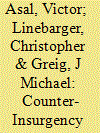

|
|
|
|
|
| Summary/Abstract |
International attacks by rebel groups are an historically important phenomenon. Yet, few scholars have sought to understand why some rebel organizations “go abroad” and commence international attacks and some do not. We theorize that a rebel group’s decision to attack internationally is partly the result of its home-state’s counter-insurgency strategy. Home-states that employ broad-based repression discourage rebels from engaging in international attacks. By contrast, home-states that employ narrowly targeted repression accelerate rebel decisions to attack internationally. Finally, concessions by the home-state are a sufficient condition for the rebel groups in our data to never attack internationally.
|
|
|
|
|
|
|
|
|
|
|
|
|
|
|
|
| 2 |
ID:
021559


|
|
|
|
|
| Publication |
April 2002.
|
| Description |
225-243
|
|
|
|
|
|
|
|
|
|
|
|
|
|
|
|
| 3 |
ID:
122766
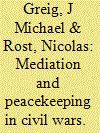

|
|
|
|
|
| Publication |
2013.
|
| Summary/Abstract |
The occurrence of outside mediation and peacekeeping has increased exponentially since the end of the Cold War. But how do third-party states and international organizations decide which civil wars to intervene in? And how do they decide whether to mediate talks between the warring parties or to send peacekeepers? In this study, we propose that third parties are influenced by their interests in a civil war country, they take into account the urgency a civil war poses, and they shy away from particularly challenging civil wars. Empirical tests confirm some of these hypotheses but also yield some contrary results. In contrast to much of the empirical literature, which has mostly treated different conflict management tools separately, this study combines two of the most important aspects of international conflict management - mediation and peacekeeping - into one theoretical framework.
|
|
|
|
|
|
|
|
|
|
|
|
|
|
|
|
| 4 |
ID:
066924
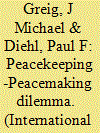

|
|
|
| 5 |
ID:
146152
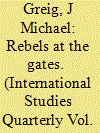

|
|
|
|
|
| Summary/Abstract |
In this paper, I build upon the conflict management, civil war, and bargaining literatures to develop and test a theoretical model that links openings for diplomacy to where civil war battles occur and how these locations change over time. I argue that the locations and movements of civil war battles provide information to both governments and rebels that influences their willingness to engage in mediation and negotiation. By identifying how civil war battles influence the willingness of warring sides to participate in diplomacy, I suggest that it is possible to identify other windows of opportunity for effective conflict management beyond waiting for a conflict to evolve into a hurting stalemate. The results of my analysis of 46 African civil conflicts shows that battle locations, battle velocity, and battle dispersion each influence the occurrence and outcomes of peace talks.
|
|
|
|
|
|
|
|
|
|
|
|
|
|
|
|
| 6 |
ID:
166002
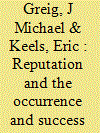

|
|
|
|
|
| Summary/Abstract |
In this article, we argue that because governments fear that accepting mediation and reaching agreements with opponents may signal weakness to other potential challengers, civil war governments tend to resist mediation as a means of demonstrating their resolve. Building on current theories of reputation in civil war, we argue that the threat of future challenges from other groups is likely to be particularly acute in states with multiple ethnic groups, especially states with high levels of ethnic exclusion. We therefore expect that civil wars in these states will be less likely to see mediation and to produce agreements when they do. By examining all instances of mediation in intrastate conflict from 1990 to 2008, we test this argument empirically and find that mediation is more likely to emerge in civil wars where there are a large number of ethnic groups, but is less likely to occur when many of those ethnic groups are excluded from the political process. Once mediation is underway, however, it is less likely to yield a negotiated settlement when there are a large number of ethnic groups, but more likely to end in a negotiated settlement when many of the ethnic groups are excluded from the political process.
|
|
|
|
|
|
|
|
|
|
|
|
|
|
|
|
| 7 |
ID:
078491


|
|
|
|
|
| Publication |
2007.
|
| Summary/Abstract |
Central to the contemporary American foreign policy debate is the issue of reducing insurgency and promoting stability in Iraq and the role of American military forces in achieving these outcomes. Military force-related proposals range from complete withdrawal to a moderate "surge" in troops to a massive escalation of the force commitment. Here, we draw upon an analysis of domestic political stability in 60 imposed political systems occurring during the period 1816-1994 to forecast the effectiveness of said force-related proposals. The analysis underscores, in part, that (i) a policy of surging American troops is unlikely to succeed, (ii) a policy of belated massive escalation reduces insurgency, but much less so than an initial policy of massive invasion coupled with massive occupation, a strategy that preempts the development of a robust insurgency
|
|
|
|
|
|
|
|
|
|
|
|
|
|
|
|
| 8 |
ID:
091368


|
|
|
| 9 |
ID:
085307


|
|
|
|
|
| Publication |
2008.
|
| Summary/Abstract |
Facilitating peace settlements among parties to a civil war represents a key challenge for policymakers. In spite of the grave consequences and relatively high frequency of civil wars, we know little about how best to manage them. In this article we examine the linked questions of under what conditions third parties provide and warring parties accept offers of mediation in civil wars. Our analysis suggests that third-party offers are closely tied to the interests a third party has in a civil war state as well as the historical ties between the third party and civil war state. Importantly, we note critical distinctions between the conditions that encourage offers of mediation from those that foster its acceptance. The theoretical and policy implications of knowing when to offer and the conditions under which an offer will be accepted could have dramatic effects on civil war termination.
|
|
|
|
|
|
|
|
|
|
|
|
|
|
|
|
|
|
|
|
|